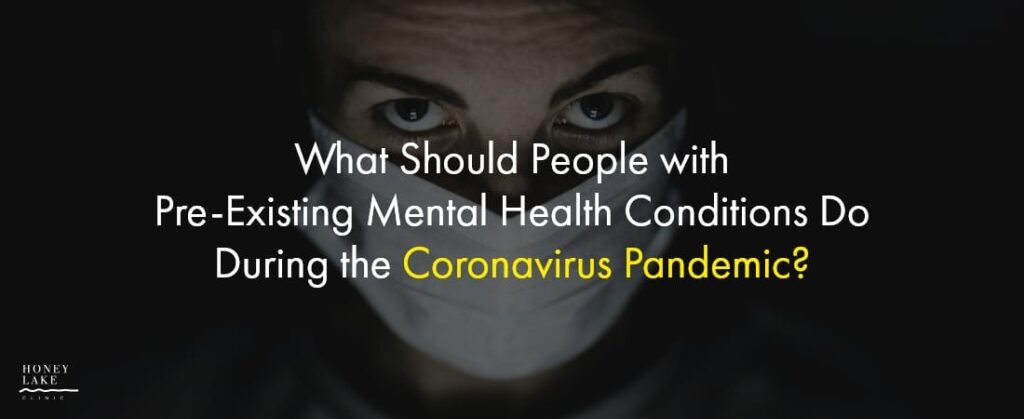What Should People with Pre-Existing Mental Health Conditions Do During the Coronavirus Pandemic?
A pandemic is stressful. The stress associated with the evolving social disruptions and health-related threats caused by the coronavirus (COVID-19) pandemic can be particularly challenging for individuals with pre-existing mental health conditions.
Uncertainty and the threat of infection can exacerbate pre-existing anxiety and worry. Efforts to minimize disease transmission can amplify contamination fears among those with OCD. Public health precautions put in place to slow the spread of the virus can exacerbate feelings of loneliness and isolation that can compound the challenges for those struggling with depression.
Stress and anxiety during an infectious disease outbreak can sometimes cause the following:
- Heightened fears over your own health and the health of your loved ones
- Worry over your financial situation or job, or loss of support services you rely on.
- Changes in your sleep or eating patterns.
- Difficulty sleeping or concentrating.
- Worsening of chronic health problems.
- Worsening of mental health conditions.
- Increased use of tobacco, and/or alcohol and other substances.
Does this sound like you or someone you love? Stress and anxiety can be overwhelming. We can help. (855) 222-4756.
COVID-19 and Mental Health
As the coronavirus pandemic has unfolded across the U.S., ordinary life has been paused. Lockdowns, travel restrictions, school closings, work closings, masks and social distancing have created levels of social isolation previously unknown. Fears about jobs, finances and food shortages present additional stressors. The practices recommended by the CDC and WHO are designed to protect the community, particularly the most vulnerable among us. However, this pandemic and the associated changes, including serious financial implications for many households, can have profound consequences on our mental health.
Taking Care of Your Mental Health
Your mental health is an important part of your overall health and wellbeing. If you have pre-existing mental health conditions or substance use disorders, you may be particularly vulnerable—the symptoms of conditions such as depression, anxiety, bipolar disorder, OCD or schizophrenia may become more pronounced, impacting all areas of your life.
You should—
- Recognize the increased risk this pandemic presents
- Maintain clinical contact; ensure adequate medication supply
- Continue your present treatment(s) and be aware of any new or worsening symptoms
- Contact your doctor or a mental health professional if stress impacts your daily activities and routines for several days in a row
- Get immediate help—dial 9-1-1—if you are in crisis
Practical Steps to Take
Create structure. Feelings of uncertainty can lead to increased stress and anxiety. Create a daily schedule for you and your family.
Limit media. Try to limit the amount of time you spend watching, reading or listening to the news. Get your information on the coronavirus outbreak from a trusted source, such as the CDC or WHO, once or twice a day. Make space in your day for activities and conversations that have nothing to do with the outbreak.
Maintain your physical health. Protect your sleep schedule. Eat healthy and nutritious meals and snacks, and at regularly scheduled times. Establish or maintain an exercise schedule. Go for a walk, a run or a bike ride. Take in fresh air. Enjoy nature.
Stay connected. Create a virtual support group and check in with those around you. Connecting face-to-face is more important than ever—utilize video-conferencing software such as Zoom, Google Hangouts and Facetime. Call and text.
Volunteer. Crises are a time for community cohesion and social solidarity, and volunteering is one way to not only help others, but yourself as well. Studies have repeatedly shown that volunteering can improve mental health. Look for organizations to donate to and for other ways to get involved helping your neighbors and community.
Take care of your spirit. Engage with your church family. If you don’t have a church home, find a place of worship that is streaming their services. Pray. Study the Bible. Listen to inspirational music.
Continue your mental health treatment. If you are currently in treatment, continue with your current plan to the best of your ability. Make sure you have ongoing access to any medications you need. Ask about video therapy or phone call appointments. Many insurers have made emergency exemptions to coverage for telehealth visits. Even if this option wasn’t available with your provider previously, it may be now. Contact them to ask about remote services.
If you are not in treatment, consider reaching out—
